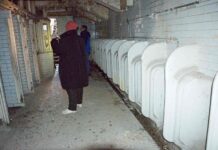Every Thursday afternoon, a new generation of coders are learning how to write computer programmes at Brixton Library. Brixton Code Club is a free session for 9 to 11 year olds where they can learn how to code.
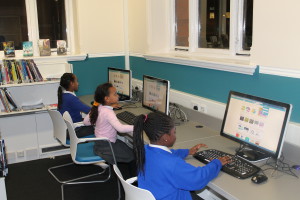
The team at Brixton Code Club see the importance of learning young. “It’s never too early to start coding,” says librarian Zoey Dixon, who organises the sessions. She started the club on the Code Club website then found one of the volunteer coding experts, Monique, through Twitter.
Monique was glad to receive computer lessons at an early age at school: “one day our wonderful, maverick maths teacher threw the curriculum out the window and told us that ‘some day [learning to use computers] might be useful.’” Luckily coding is now on the school curriculum, and Code Club helps children develop the skills they learn in class.
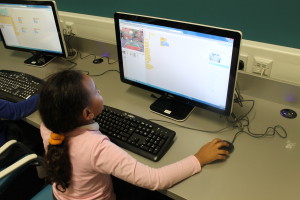
The children evidently enjoy the sessions, and show me the games they’re creating. At just seven years old, Heaven is the youngest member of the group. “When I look at someone using the computer at home I think what they’re doing is fun,” she says as she makes a basketball dunk through a hoop.
“Everyone starts at Level 1,” explains Marie, 10, “I’m on Level 3.” She’s making something a bit more complicated, a football game where the player has to dodge opponents to score a touch-down. ‘Game Over’ pops up when you lose. The code looks confusing to me, but Marie quickly tweaks it and ‘Game Over’ takes over the whole screen.
By this point, I’m already itching to try it when I get home and I wonder how long it takes to get to Marie’s level. “The fundamentals of coding can be learnt in a few hours,” says Graham, the other volunteer coding expert who runs the sessions, “while learning to code a reasonably complex application can take weeks – programming can be one of the most complicated activities attempted.”
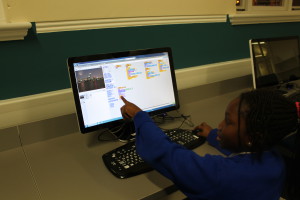
At Code Clubs children use Scratch, a free coding tool and online community created by the Massachusetts Institute of Technology which allows novices to get to grips with the basic concepts. “We use Scratch as the is code written by moving blocks around the screen rather than typing,” says Graham.
The Brixton club is part of a network of similar local clubs around the country organised by Code Club, a nationwide not-for-profit. If you want to start a club you just search the Code Club website for local coders and programmers willing to donate their time, then look for potential venues and participants.
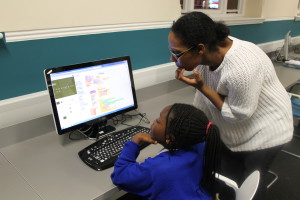
The organisation’s mission is to inspire children to create things using digital technology, seeing coding as an essential skill for the modern age: “It’s not just enough for children to know how to use technology,” it says on their website, “they should know how it works and how to build it too.”
Zoey points out the important role of local libraries in providing this extra level of support, explaining that libraries are about educating people as well as loaning books. Monique tells me that she taught herself to code from “magazines and books from the tiny computing section tucked away in the basement of Southwark Library”.
Following the recent Brixton Library refurbishment there is space for up to 10 children at each session, where they use state-of-the-art desktop computers with large, clear screens. Zoey also has plans to expand Code Club to other Lambeth Libraries – it’s already started at Streatham – and is planning to get the children to create a game together that people can play at the Library later this year.
Brixton Code Club runs every Thursday afternoon from 4pm for children aged 9-11. Visit the club site to get in touch with Zoey if you’re interested in booking your child a slot.

